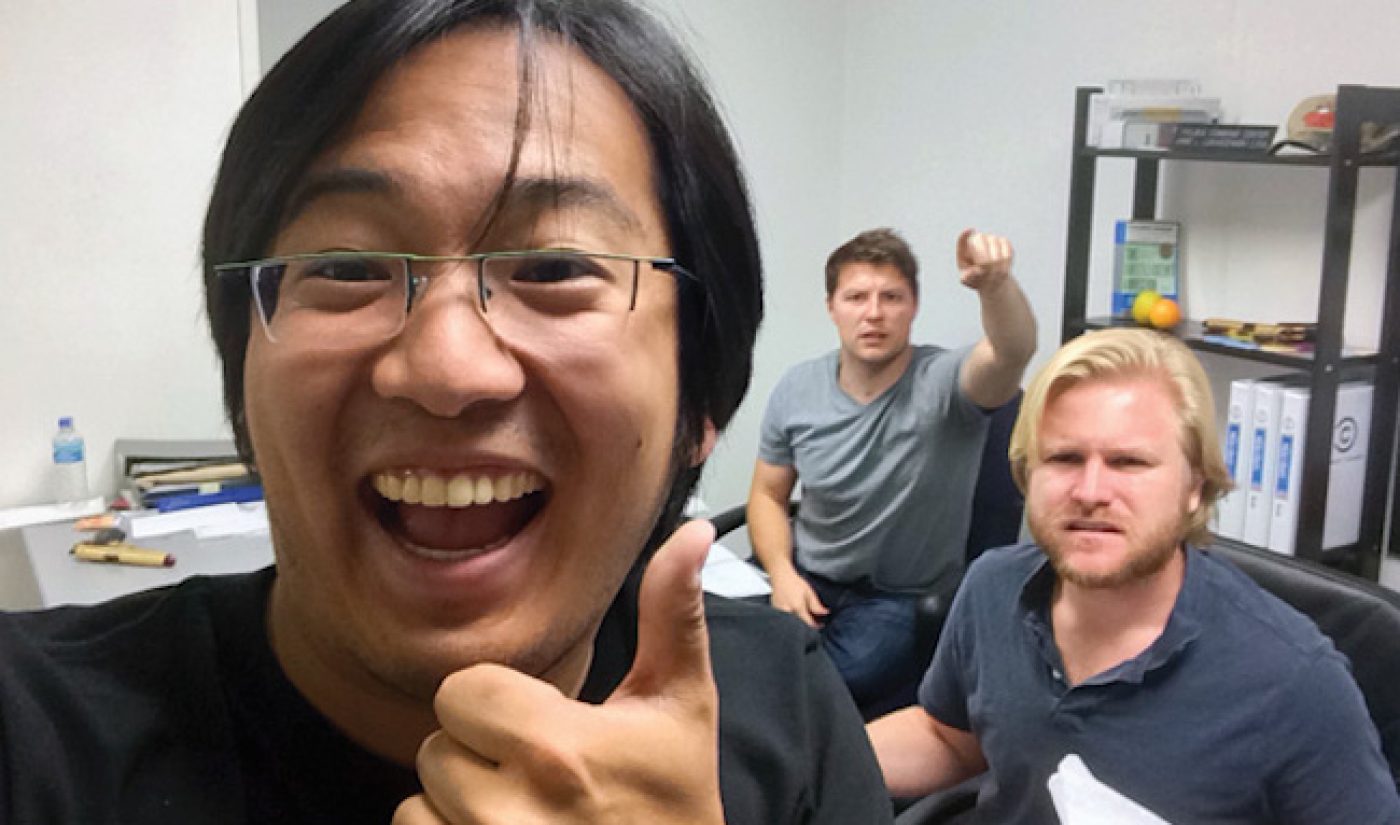Freddie Wong may very well be the most experienced crowdfunder in the entire entertainment industry. The filmmaker and special effects guru, who also spends a lot of quality time in front of the camera, has helped to raise no less than a cummulative $1,980,210 from 27,180 backers over three campaigns in three years under the banner of his, Matt Arnold, and Desmond Dolly’s production shop RocketJump, all for consecutive seasons of their hit, long-form, action-gamer-comedy Video Game High School (aka VGHS).
Given that crowdfunding experience (not to mention his experience with cultivating an audience on other platforms, like the 7.5+ million subscribers on the RocketJump YouTube channel), Wong is the go-to individual within the online video industry when you’re thinking about starting a crowdfunding campaign and need advice. The guys at Wong Fu got his help on their successful campaign. And Burnie Burns at Rooster Teeth gives Wong a lot of credit when he talks about the campaign for his feature film (which turned out to be the fourth most-funded film campaign on any crowdfunding platform of all time).
So, we decided to talk to Wong ourselves and asked him to share some of the knowledge he’s gathered around crowdfunding after three incredibly successful runs.

Subscribe to get the latest creator news
Tubefilter: What’s the most important part of making a crowdfunding campaign for film or video successful?
Freddie Wong: You have to go into it with an audience pre-set. There hasn’t been a major successful film campaign without a built-in audience and the reason for that is people treat crowdfunding like pre-ordering. You look at most of what gets funded to a crazy degree. It’s all products! People say, “I want the Pebble watch,” or whatever the product is, and they order it.
When it comes to doing a film or something more intangible, a lot of the success is what you offer on the perks side.
TF: So, what makes a good perk?
FW: The perks need to be interesting, especially when it comes to physical goodies. And more importantly, there needs to be an aspect of exclusivity or rarity. We’ve done props from the show, signed poster, and had DVD covers and poster designs that you could only get through the crowdfunding campaigns. Sure, we sell products in our store, but getting something exclusively through the campaign is different.
You need to give people a reason to donate. If they have to act now or will never have another chance again of getting this perk, that’s a powerful motivator.
TF: But if you didn’t have this rarity baked into the perks, aren’t people still simply going to be happy to contribute to your campaign just to support you?
FW: Yes, but the most successful campaigns understand that you need to give a very strong incentive in order for someone to hand over their cash. The people that put on those campaigns treat the campaign less like a charitable donation and more likely think of ways they can give value to their fans.
Matt always says the first $5 a funder gives you is charity, but everything else is them wanting to buy something.
TF: Do you notice a difference in viewership or interactivity between the fans that contribute to your campaigns and the fans that just watch your videos?
FW: Well, correlation is not necessarily causality. A lot of people who put money down and preorder something are already a very self-selecting group of fans who would be engaging a lot on their own. So, it’s very difficult to separate out if the act of putting money down is increasing that interaction. But it’s definitely easy to assume that. Once you feel like you’re a part of a project you feel like you’re more invested in that project.
TF: But what about in terms of getting the word out about your project? Does it help with that?
FW: It does help with marketing a bit. Getting people excited about something and contributing in exchange for an exclusive look or access before it goes public is a strong driver of action. Fans like being able to have cool stuff that you can’t get anywhere else and they like talking about it.
TF: For the first two seasons of Video Game High School you were on Kickstarter. You raised $273,725 for Season One and $808,341 for Season Two. For the third season you went to Indiegogo and raised $891,144. Why the switch?
FW: We always like to try different things. And Indiegogo offers flexible funding and PayPal support. We have a lot of young fans who don’t have credit cards, but have access to a PayPal account.
So, that was one of the main reasons, but the team over there was also very helpful and provided a ton of insight. We have relatively very limited experience with crowdfunding, so it’s always helpful to hear as many viewpoints as possible, especially because there is no playbook. The more information you can get a hold of the the better. Getting that support and being able to talk to their team was helpful.
TF: Were there any particular perks that you offered that were surprised about how well they did?
FW: Well, we tried to make all of our perks great. If we didn’t think it was good, we wouldn’t put it up. So we weren’t surprised that people liked a bunch of the stuff, but what was shocking for us was the demand for our hoodies and for signed props. Even though the props were at $350 price point more than 100 people wanted something that was theirs from the show.
Again, people put a lot of value on a physical thing that’s unique and impossible to get anywhere else.
TF: You have three successful crowdfunding campaigns under your belt, but you’re at a point in your career where you could probably get your projects funded in other ways. Will you still use crowdfunding campaigns in the future?
FW: Crowdfunding was a major part of the financing of those first couple of seasons. As our careers develop, it may become a lesser part of the financing, but that doesn’t mean we won’t use it. We look at people like Louis CK and Aziz Ansari who are essentially doing pre-orders online. Fans like that and they also like participating and doing cool and exclusive things. We can still do that. We may not be able to say we need to do it, but we can still do it. Then it just becomes less about getting the project done and more about pre-ordering, getting fans involved, and giving them an opportunity to get cool stuff.
You can check out Season 3 of Video Game High School over at RocketJump’s YouTube channel.








